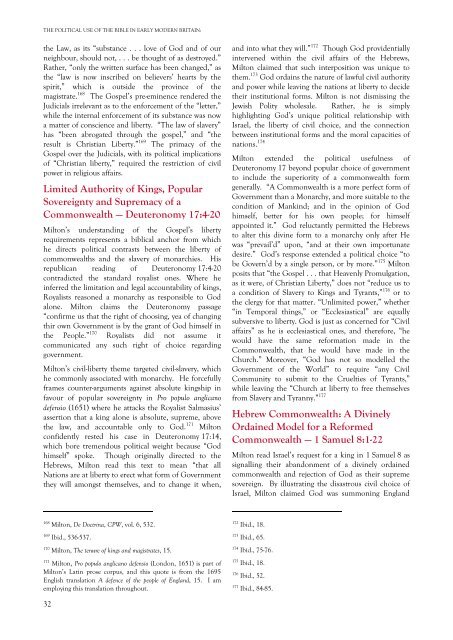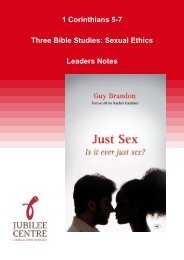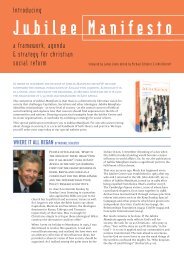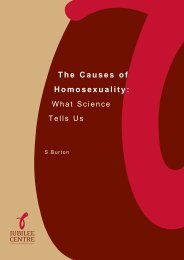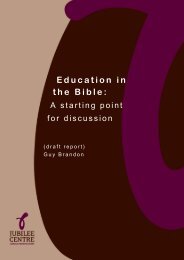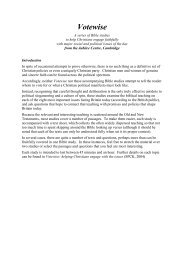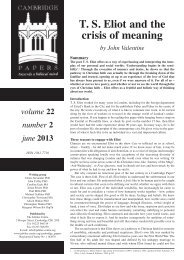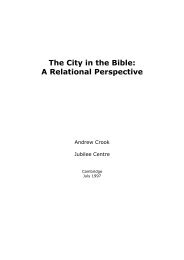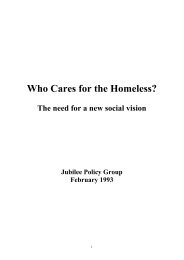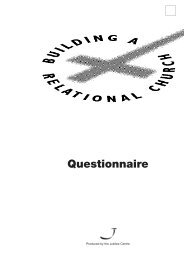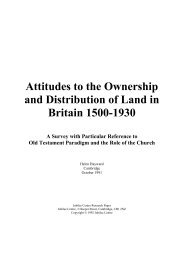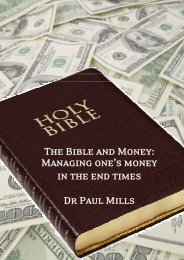Report Template - Jubilee Centre
Report Template - Jubilee Centre
Report Template - Jubilee Centre
You also want an ePaper? Increase the reach of your titles
YUMPU automatically turns print PDFs into web optimized ePapers that Google loves.
THE POLITICAL USE OF THE BIBLE IN EARLY MODERN BRITAIN:<br />
the Law, as its “substance . . . love of God and of our<br />
neighbour, should not, . . . be thought of as destroyed.”<br />
Rather, “only the written surface has been changed,” as<br />
the “law is now inscribed on believers’ hearts by the<br />
spirit,” which is outside the province of the<br />
magistrate. 168 The Gospel’s pre-eminence rendered the<br />
Judicials irrelevant as to the enforcement of the “letter,”<br />
while the internal enforcement of its substance was now<br />
a matter of conscience and liberty. “The law of slavery”<br />
has “been abrogated through the gospel,” and “the<br />
result is Christian Liberty.” 169 The primacy of the<br />
Gospel over the Judicials, with its political implications<br />
of “Christian liberty,” required the restriction of civil<br />
power in religious affairs.<br />
Limited Authority of Kings, Popular<br />
Sovereignty and Supremacy of a<br />
Commonwealth — Deuteronomy 17:4-20<br />
Milton’s understanding of the Gospel’s liberty<br />
requirements represents a biblical anchor from which<br />
he directs political contrasts between the liberty of<br />
commonwealths and the slavery of monarchies. His<br />
republican reading of Deuteronomy 17:4-20<br />
contradicted the standard royalist ones. Where he<br />
inferred the limitation and legal accountability of kings,<br />
Royalists reasoned a monarchy as responsible to God<br />
alone. Milton claims the Deuteronomy passage<br />
“confirme us that the right of choosing, yea of changing<br />
thir own Government is by the grant of God himself in<br />
the People.” 170 Royalists did not assume it<br />
communicated any such right of choice regarding<br />
government.<br />
Milton’s civil-liberty theme targeted civil-slavery, which<br />
he commonly associated with monarchy. He forcefully<br />
frames counter-arguments against absolute kingship in<br />
favour of popular sovereignty in Pro populo anglicano<br />
defensio (1651) where he attacks the Royalist Salmasius’<br />
assertion that a king alone is absolute, supreme, above<br />
the law, and accountable only to God. 171 Milton<br />
confidently rested his case in Deuteronomy 17:14,<br />
which bore tremendous political weight because “God<br />
himself” spoke. Though originally directed to the<br />
Hebrews, Milton read this text to mean “that all<br />
Nations are at liberty to erect what form of Government<br />
they will amongst themselves, and to change it when,<br />
and into what they will.” 172 Though God providentially<br />
intervened within the civil affairs of the Hebrews,<br />
Milton claimed that such interposition was unique to<br />
them. 173 God ordains the nature of lawful civil authority<br />
and power while leaving the nations at liberty to decide<br />
their institutional forms. Milton is not dismissing the<br />
Jewish Polity wholesale. Rather, he is simply<br />
highlighting God’s unique political relationship with<br />
Israel, the liberty of civil choice, and the connection<br />
between institutional forms and the moral capacities of<br />
nations. 174<br />
Milton extended the political usefulness of<br />
Deuteronomy 17 beyond popular choice of government<br />
to include the superiority of a commonwealth form<br />
generally. “A Commonwealth is a more perfect form of<br />
Government than a Monarchy, and more suitable to the<br />
condition of Mankind; and in the opinion of God<br />
himself, better for his own people; for himself<br />
appointed it.” God reluctantly permitted the Hebrews<br />
to alter this divine form to a monarchy only after He<br />
was “prevail’d” upon, “and at their own importunate<br />
desire.” God’s response extended a political choice “to<br />
be Govern’d by a single person, or by more.” 175 Milton<br />
posits that “the Gospel . . . that Heavenly Promulgation,<br />
as it were, of Christian Liberty,” does not “reduce us to<br />
a condition of Slavery to Kings and Tyrants,” 176 or to<br />
the clergy for that matter. “Unlimited power,” whether<br />
“in Temporal things,” or “Ecclesiastical” are equally<br />
subversive to liberty. God is just as concerned for “Civil<br />
affairs” as he is ecclesiastical ones, and therefore, “he<br />
would have the same reformation made in the<br />
Commonwealth, that he would have made in the<br />
Church.” Moreover, “God has not so modelled the<br />
Government of the World” to require “any Civil<br />
Community to submit to the Cruelties of Tyrants,”<br />
while leaving the “Church at liberty to free themselves<br />
from Slavery and Tyranny.” 177<br />
Hebrew Commonwealth: A Divinely<br />
Ordained Model for a Reformed<br />
Commonwealth — 1 Samuel 8:1-22<br />
Milton read Israel’s request for a king in 1 Samuel 8 as<br />
signalling their abandonment of a divinely ordained<br />
commonwealth and rejection of God as their supreme<br />
sovereign. By illustrating the disastrous civil choice of<br />
Israel, Milton claimed God was summoning England<br />
168<br />
Milton, De Doctrina, CPW, vol. 6, 532.<br />
169<br />
Ibid., 536-537.<br />
170<br />
Milton, The tenure of kings and magistrates, 15.<br />
171<br />
Milton, Pro populo anglicano defensio (London, 1651) is part of<br />
Milton’s Latin prose corpus, and this quote is from the 1695<br />
English translation A defence of the people of England, 15. I am<br />
employing this translation throughout.<br />
172<br />
Ibid., 18.<br />
173<br />
Ibid., 65.<br />
174<br />
Ibid., 75-76.<br />
175<br />
Ibid., 18.<br />
176<br />
Ibid., 52.<br />
177<br />
Ibid., 84-85.<br />
32


